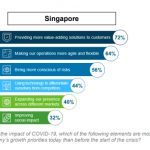Half of Singaporeans think their earnings will be significantly impacted by COVID-19 yet 72% believe they have the skills needed to thrive in an increasingly digital future
- But still, young Singaporeans confident in their skills to thrive despite COVID-19 slump

A Standard Chartered survey finds that COVID-19 is significantly impacting personal finances globally, with one-third already earning less (34 per cent in Singapore) and more than half expecting the pandemic to further affect their income and/or employment.
Yet over three-quarters (72 per cent in Singapore) are confident they have the skills needed to increase their earnings and thrive in an increasingly digital world. This is driven by young people (aged 18-34) and those in emerging markets, who are the most confident, and prepared to work hardest to realise opportunities post-pandemic.
The study of 12,000 adults across 12 markets – Singapore, Hong Kong, Taiwan, Mainland China, Indonesia, Malaysia, India, UAE, Kenya, Pakistan, the UK and the US – offers insights into their financial wellbeing and employment outlook in these challenging times, and how banks can play a role in helping them manage their money.
A stark contrast was found between the financial reality that people face and their confidence in the future, which can be explained by a willingness – particularly among young people and those in emerging markets – to work harder, take steps to adapt income streams and reskill if they can, in order to increase their earnings.
Young people are particularly confident, with 80 per cent of young people globally (73 per cent in Singapore) feeling they have the digital skills needed to thrive post-COVID-19, compared to 63 per cent of those aged over 65 (49 per cent in Singapore). Also, with many graduating or leaving school in the midst of a global recession, the younger generation are more willing, or able, to adapt to current circumstances in order to get ahead.
For example, 66 per cent of 25 to 34-year olds in Singapore are considering setting up a second income stream to increase their earnings; and 83 per cent of those aged 18 to 34 are willing to work harder to get ahead, compared with 55 per cent of those aged over 55. However, in contrast to this – and the global trend – in Singapore, it is those aged 55 to 64 (71 per cent) that are most likely to consider retraining or new skill development.
Singaporeans also buck the trend when it comes to entrepreneurialism. Singapore’s Millennials and Generation Z are less likely than the global average to respond to the crisis by starting a new business. Only 34 per cent of those aged 18 to 44 would consider doing so, compared to 52 per cent globally. Around the world, the level of flexibility, adaptability and entrepreneurialism tends to decrease with age, along with confidence, despite – or perhaps because – older generations are more established in their careers.
The divide is even more stark when comparing developed and developing markets. Those in established global economies are not only less confident they have the digital skills needed to thrive amidst the downturn, but also less willing to adapt and take steps to increase their income.
This divide is reflected in levels of interest in using technology more, where there is a clear split between Western and Non-Western markets. In all markets except the UK (73 per cent) and USA (77 per cent), over 80 per cent of people want to use more technology at work (89 per cent in Singapore).
While the pandemic has acted as a catalyst for the growth of online banking, with over half globally using online services more, the shift has been more apparent in fast growing markets. For example, increased use of mobile devices for banking services is most prominent in India (79 per cent), the UAE (72 per cent), Kenya (69 per cent), and Singapore (67 per cent).
Fast growth markets are also more likely to want their banks to help improve their confidence at managing money digitally as they increasingly look to bank online – Kenya (91 per cent), India (84 per cent) and Indonesia (84 per cent).
There is one clear area of almost unanimous agreement; a global desire for more flexibility when it comes to working arrangements post-COVID-19. In Singapore, 83 per cent (77 per cent globally) want more flexible working arrangements post-COVID-19, and where applicable, 76 per cent (70 per cent globally) would prefer to spend less time in the office once the pandemic is over.
Ben Hung, CEO of Retail Banking and Wealth Management, and Regional CEO for Greater China and North Asia, Standard Chartered Bank, said:
“Young people around the world have been hit particularly hard by the economic impact of the pandemic. Many are in insecure employment or graduating into a tough job market. Yet their confidence, adaptability and willingness to work hard, especially in fastgrowing markets, provides hope for the recovery. Many are considering starting a new business in the wake of the pandemic but want to learn how to manage their finances better. They must be supported. Banks have a role to play both by helping them manage their money and providing tools that make banking easier so they can focus on leading the way to recovery.”
Dwaipayan Sadhu, Head of Retail Banking, Standard Chartered Bank Singapore, said:
“The millennials and Generation Z are clearly strong digital natives and it is not surprising that they feel confident about thriving in a digital world. We are witnessing the same trend among our younger clients; they are adopting and adapting to digital very naturally. For example, since the effects of COVID-19 hit us this year, there has been a historical growth in digital adoption with the number of digital active clients under 35 years old growing five times that of our older clients.”






